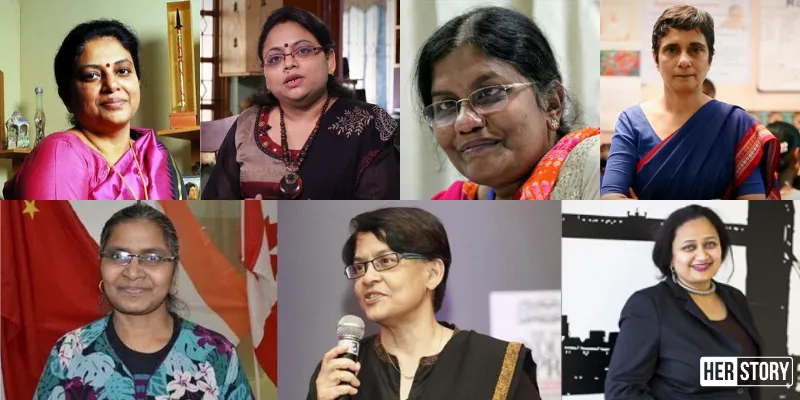Meet 7 Indian women scientists whose inventions and experiments have helped in the progress of science and technology
HerStory presents the top Indian women scientists whose achievements have broadened the horizons of science and technology and brought laurels to the country.
Women in science from being a minority are now occupying the most important positions, in realms one thought were unachievable before. From winning Nobel Prizes to heading NASA, women scientists have etched their names in history.
In India, science and tech remains a male-dominated field like much of the world. However, women like Ritu Karidhal, Chandrima Saha and others have taken on leading roles in organisations like ISRO and INSA, initiated new projects with far-reaching results.
Here is a list of women whose scientific endeavours have broadened the horizons of science on earth and beyond.

(Top row)Tessy Thomas, Ritu Karidhal, M Vanitha, Gagandeep Kang; (Bottom) Mangala Mani, Chandrima Shaha, Kamakshi Sivaramakrishnan.
Tessy Thomas
Tessy Thomas, known as the 'Missile Woman' of India is the Director General of Aeronautical Systems and the former Project Director for Agni-IV missile in Defence Research and Development Organisation (DRDO). She is the first woman scientist to head a missile project in India.
The 56-year-old has a doctorate in missile guidance and has worked in the field for over three decades. She has contributed in guidance, trajectory simulation and mission design at the DRDO. She designed the guidance scheme for long-range missile systems, which is used in all Agni missiles. She was conferred with Agni Self-reliance award in 2001. She is a recipient of multiple fellowships and honorary doctorates.
Ritu Karidhal
As Mission Director of the Chandrayaan-2 mission, Ritu Karidhal was feted for role in helming one of India’s most ambitious lunar projects. She was responsible for detailing and the execution of the craft's onward autonomy system, that independently operated the satellite’s functions in space and responded appropriately to malfunctions.
Dubbed as the ‘Rocket Woman of India’ Ritu joined ISRO in 2007 and was also the Deputy Operations Director to India’s Mars Orbiter mission, Mangalyaan.
An aerospace engineer, she was born and raised in Lucknow in a middle-class family. She has a BSc in physics from the University of Lucknow and ME degree in aerospace engineering from the Indian Institute of Science.
In 2007, she also received the ISRO Young Scientist Award from APJ Abdul Kalam, then President of India.
Muthayya Vanitha
Muthayya Vanitha is the Project Director of Chandrayaan-2. She is the first woman to lead the interplanetary mission at ISRO. She was promoted from Associate Director to Project Director of the mission. She hails from Chennai and is an electronics system engineer from the College of Engineering, Guindy.
She has worked at ISRO for over three decades. She started as a junior engineer in hardware testing and development and has risen up the ladder steadily. She has occupied several roles such as leading the Telemetry and Telecommand Divisions in the Digital Systems Group of ISRO Satellite Centre, and has been the Deputy Project Director for several satellites including Cartosat-1, Oceansat-2, and Megha-Tropiques. . Previously she has also managed data operations for remote sensing satellites.
In 2006, she received the Best Woman Scientist Award.
Gagandeep Kang
Gagandeep Kang, a virologist and scientist, is known for her interdisciplinary research in transmission, development, and prevention of enteric infections and their sequelae in children in India.
She has been elected as a Fellow of the Royal Society (FRS), the first Indian woman scientist to receive this honour. The FRS is the oldest scientific institution in the world, and is dedicated to promoting excellence in science.
Gagandeep is the Executive Director of the Translational Health Science and Technology Institute (THSTI), Faridabad, and is the Chairperson of the World Health Organisation (WHO) Southeast-Asia's Immunisation Technical Advisory Group.
To develop practical approaches to support public health, she also built national rotavirus and typhoid surveillance networks, established laboratories to support vaccine trials, and conducted phase one-three- clinical trials of vaccines, a comprehensive approach that has supported two WHO prequalified vaccines made by two Indian companies. She is also investigating the complex relationships between infection, gut function, and physical and cognitive development, and seeking to build a stronger human immunology research in India.
Mangala Mani
The ‘polar woman of ISRO’, Mangala Mani is ISRO’s first woman scientist to spend more than a year in the icy landscape of Antarctica. The 56-year-old had never experienced snowfall before she was selected for the mission. In November 2016, she was part of the 23-member team that went on an expedition to Bharati, India’s research station in Antarctica. She spent 403 days at the southernmost continent operating and maintaining ISRO’s ground station.
She will soon be featured in a BBC series about women in science. In a newspaper article, she is quoted as saying, “Women are venturing into every field. Women just need to be willing, ready and take that opportunity when it comes. With the knowledge explosion, the sky is not the limit, there is much more beyond.”
Kamakshi Sivaramakrishnan
Kamakshi Sivaramakrishnan technology is onboard NASA's New Horizon mission, which is probing Pluto. It is NASA’s farthest space mission. She is responsible for building the algorithm and the chip that is responsible for bringing information from Pluto, whose existence as a planet was being questioned. The chip on board the spacecraft collects signals and sends them back to the space station which is three billion miles away.
After completing her undergraduate degree in Mumbai, Kamakshi went on to study information theory at Stanford. Later, explored the idea of machine learning stack as lead scientist at AdMob, after which she began research where her technology led her to work closely with the cosmos.
Now, she has gone back to learning stack and has created an ingenious technology of her own, in the form of Drawbridge – which went on to be America’s fastest-growing women-led companies.
Based in San Mateo, California, she has been building a complex algorithm to be more intuitive about how users interact with ads online, as well as across different interfaces – smartphones, tablets, laptops, etc.
Chandrima Shaha
Chandrima is a biologist and the first ever woman president of the Indian National Science Academy (INSA). She assumed office on January 1 this year. In 85 years of its existence, the Academy has never had a woman president until she took over.
Chandrimawas first elected to INSA in 2008, and served as its Vice President between 2016 and 2018. She specialises in cell biology, and has conducted extensive research about the ‘Leishmania’ parasite which causes Kala Azar. She has also authored over 80 research papers. She has received many awards like the Shakuntala Amirchand Award of ICMR (1992), and the Special Award for 50th Anniversary of DNA Double Helix Discovery (2003) for "significant contributions towards understanding of Cell Death Processes in different Model Organisms.
Being ignored by male colleagues in her early days as a scientist, who wouldn’t even shake hands with a woman scientist, motivated her to keep going no matter what, and establish herself as a successful one.
(Edited by Rekha Balakrishnan)









